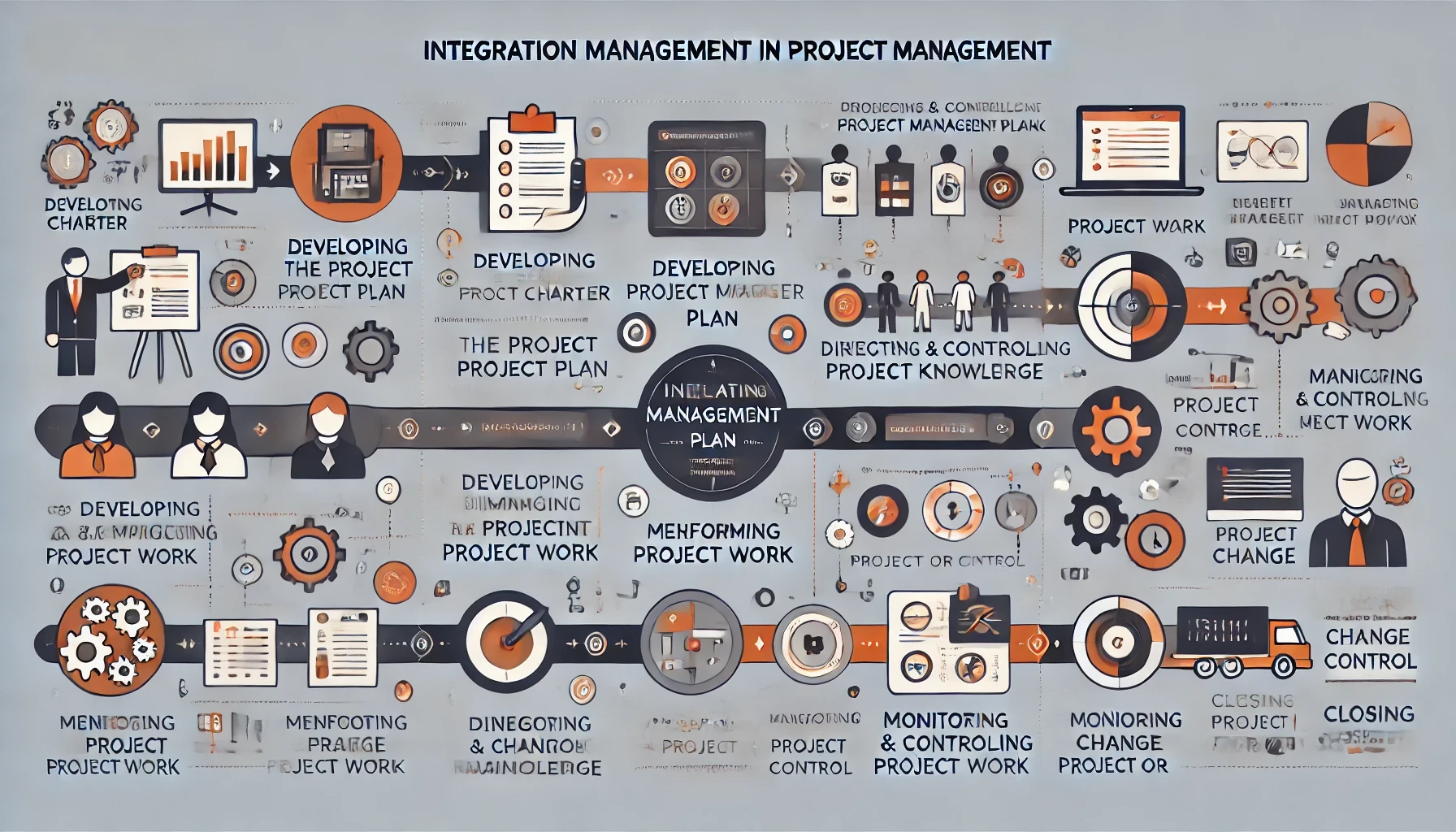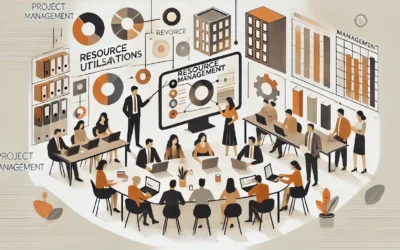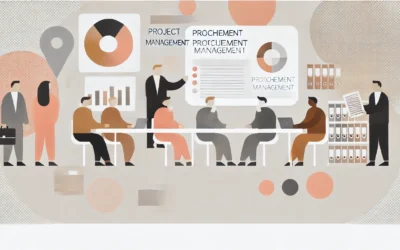The Unifying Force of Project Management
Integration Management serves as the backbone of effective project management, acting as the force that brings together all the moving parts of a project into a cohesive whole. It involves coordinating all elements of a project to ensure they work in harmony toward a common objective. Like a conductor leading an orchestra, a project manager uses Integration Management to ensure that each section performs its part at the right time and in the right way.
Recognised by the Project Management Institute (PMI) as one of the ten key Project Management Knowledge Areas, Integration Management provides the framework that enables project managers to effectively plan, execute, and control their projects with a unified approach.
In this article, we’ll explore the key components of Integration Management, its critical importance in the project management process, and practical tips to implement it successfully. By mastering these techniques, you’ll be better equipped to deliver projects on time, within scope, and on budget.
What Is Integration Management?
Integration Management is the process of identifying, defining, combining, unifying, and coordinating various project management activities. This knowledge area ensures that the project’s different elements are properly aligned and that resources are efficiently utilised. Without effective integration, even the most carefully planned projects can fall into disarray.
Think of Integration Management as the central hub that connects all aspects of a project, including:
- Scope Management
- Schedule Management
- Cost Management
- Quality Management
- Resource Management
- Communications Management
- Risk Management
- Procurement Management
- Stakeholder Management
By bringing these elements together, Integration Management helps prevent projects from becoming fragmented collections of activities. Instead, it creates a unified approach that aligns with organisational strategies and goals.
Key Components of Integration Management
Developing the Project Charter
The project charter formally authorises the project, providing a clear statement of its objectives, scope, and key stakeholders. This foundational document serves several crucial purposes:
- Officially recognises the existence of the project
- Establishes the project manager’s authority
- Documents high-level requirements and constraints
- Outlines key deliverables and initial milestones
- Identifies major stakeholders and their interests
Creating a robust project charter involves collaboration with key stakeholders to ensure their needs and expectations are accurately captured. A well-crafted charter acts as a reference point throughout the project lifecycle, helping maintain focus on the original project goals and constraints.
“A strong project charter is like a solid foundation for a building,” notes Ryan from Project Success Hub. “Without it, even the most well-designed project can collapse under pressure.”
Developing the Project Management Plan
The project management plan is a comprehensive document that outlines how the project will be executed, monitored, and controlled. Unlike the charter, which provides high-level direction, the management plan offers detailed guidance on project implementation.
This plan integrates all subsidiary plans, including:
- Scope management plan
- Schedule management plan
- Cost management plan
- Quality management plan
- Resource management plan
- Communications management plan
- Risk management plan
- Procurement management plan
- Stakeholder engagement plan
Developing an effective project management plan requires detailed planning and collaboration with the project team and stakeholders. The plan should be dynamic and flexible, allowing for adjustments as the project progresses and circumstances change.
Directing and Managing Project Work
This component involves leading the project team to achieve the project objectives. It’s where planning transforms into action, and includes:
- Executing the activities defined in the project management plan
- Implementing approved changes
- Ensuring deliverables meet quality standards
- Managing team performance and productivity
- Addressing issues and obstacles as they arise
Effective direction and management require continuous coordination with team members, stakeholders, and other project participants. Project managers must be adept at problem-solving and decision-making to address any issues that arise during project execution.
Regular status meetings, progress reports, and performance reviews are critical to keeping the project on track. Additionally, project managers must be proactive in identifying potential risks and implementing corrective actions to mitigate their impact.
Managing Project Knowledge
Knowledge management involves capturing, organising, and sharing information to achieve the project’s objectives and contribute to organisational learning. This process ensures that valuable lessons learned are documented and shared, helping to improve future project performance.
There are two primary types of knowledge in project management:
- Explicit knowledge: Documented information such as plans, reports, and guidelines
- Tacit knowledge: Experiential know-how that team members possess but may not have documented
Effective knowledge management requires a systematic approach to capturing, distributing, and using knowledge. This might include:
- Creating a lessons learned database
- Establishing knowledge-sharing sessions
- Developing project wikis or repositories
- Implementing mentoring programmes
- Conducting regular retrospectives
By fostering a culture of continuous learning and improvement, organisations can leverage past experiences to enhance future project outcomes.
Monitoring and Controlling Project Work
Monitoring and controlling involves tracking, reviewing, and reporting project progress to ensure performance meets objectives defined in the project management plan. This ongoing process helps project managers identify any deviations from the plan and take corrective actions to keep the project on track.
Key monitoring and controlling activities include:
- Measuring project performance against baseline plans
- Analysing variances and trends
- Evaluating effectiveness of corrective actions
- Forecasting future performance based on current data
- Recommending preventive and corrective changes
Project managers use various performance measurement techniques such as earned value management (EVM) to assess project performance and progress. Regular progress reports, variance analysis, and trend analysis are essential tools for monitoring project health.
Performing Integrated Change Control
Change is inevitable in projects. Integrated change control involves reviewing all change requests, approving changes, and managing changes to deliverables, project documents, and the project management plan. This process ensures that changes are systematically evaluated and implemented without negatively impacting project objectives.
A formal change control process typically includes:
- Documenting the proposed change
- Evaluating impacts on project constraints (scope, time, cost, quality)
- Securing appropriate approvals
- Updating project plans and documents
- Communicating changes to stakeholders
- Implementing the approved changes
Effective change management helps prevent scope creep, ensures that project resources are used efficiently, and maintains stakeholder satisfaction by ensuring that changes are well-documented and controlled.
Closing the Project or Phase
Project closure involves finalising all activities across the project management process groups to formally complete the project or phase. This often-overlooked component of Integration Management is essential for:
- Confirming that all project work is complete
- Ensuring deliverables are accepted by the customer
- Documenting lessons learned
- Releasing project resources
- Closing financial accounts
- Archiving project information
The project closure phase is an opportunity to review the project’s successes and areas for improvement. Conducting a post-project evaluation helps capture valuable insights that can benefit future projects. This phase also involves ensuring that all contractual obligations have been met and that all project documentation is archived for future reference.
Importance of Integration Management
Integration Management serves as the glue that holds the project together, offering numerous benefits:
Alignment with Organisational Objectives
It ensures that project goals remain aligned with broader organisational strategies, maintaining focus on delivering business value rather than just completing tasks.
Coordination of Project Activities
Integration Management provides the framework for coordinating diverse project activities, preventing siloed thinking and promoting collaboration across functional areas.
Optimised Resource Utilisation
By taking a holistic view of the project, Integration Management helps optimise the allocation and use of resources, reducing waste and inefficiency.
Effective Change Management
It establishes the processes for evaluating and implementing changes consistently, minimising disruption and ensuring changes support project objectives.
Enhanced Risk Management
Integration Management improves risk identification and mitigation by considering how risks in one area might impact other aspects of the project.
Improved Stakeholder Engagement
By coordinating all aspects of stakeholder communication and management, it helps maintain stakeholder satisfaction and support throughout the project lifecycle.
Successful Project Completion
Perhaps most importantly, effective Integration Management significantly increases the likelihood of successful project delivery, with all objectives met and stakeholders satisfied.
Practical Tips for Effective Integration Management
Develop a Comprehensive Project Charter and Plan
Ensure that the project charter clearly defines the project’s objectives, scope, and key stakeholders. Develop a detailed project management plan that integrates all subsidiary plans and outlines how the project will be managed. A comprehensive plan serves as a roadmap, guiding the project team through each phase of the project lifecycle.
Foster a Culture of Open Communication
Maintain open and transparent communication with all stakeholders. Use appropriate communication tools to facilitate real-time collaboration and ensure that everyone is informed and aligned. Effective communication helps prevent misunderstandings and ensures that all project participants are aware of their roles and responsibilities.
Consider implementing:
- Regular team meetings with clear agendas
- Stakeholder update sessions
- Digital collaboration platforms
- Visual management tools like dashboards
- Anonymous feedback channels for sensitive issues
Utilise Project Management Software
Leverage project management software to track progress, manage resources, and facilitate communication. Tools like Microsoft Project, Asana, Jira, or Trello can help streamline project activities and improve coordination. These tools provide a centralised platform for managing project tasks, timelines, and resources, enhancing overall project efficiency.
When selecting software, consider:
- The complexity of your projects
- Team size and distribution
- Integration with existing systems
- Reporting capabilities
- User-friendliness and learning curve
Document and Share Lessons Learned
Throughout the project, document any lessons learned and best practices. Share these insights with the team and the organisation to improve future project performance. Regularly reviewing and updating the lessons learned repository helps create a culture of continuous improvement and knowledge sharing.
Effective lessons learned sessions should:
- Be scheduled at key project milestones
- Include all team members
- Focus on both successes and challenges
- Avoid blame and focus on improvement
- Result in actionable recommendations
Implement a Robust Change Control Process
Establish a formal process for managing changes to the project. Ensure that all change requests are thoroughly evaluated, and only approved changes are implemented. A robust change control process helps maintain project stability and ensures that changes do not adversely affect project outcomes.
Key elements of an effective change control process include:
- A standard change request form
- Clearly defined approval authorities
- Impact assessment procedures
- Communication protocols for approved changes
- Implementation tracking
Conduct Regular Progress Reviews
Regularly review project progress against the plan. Identify any deviations and take corrective actions promptly to keep the project on track. Regular progress reviews help identify potential issues early, allowing for timely interventions to prevent project delays and cost overruns.
Consider implementing:
- Weekly team status meetings
- Monthly executive reviews
- Quarterly strategic assessments
- Visual progress dashboards
- Milestone celebration events
Ensure Proper Project Closure
At the end of the project or phase, ensure that all activities are completed, deliverables are accepted, and lessons learned are documented. Conduct a final project review with the team and stakeholders to capture feedback and insights. Proper project closure ensures that all project objectives have been met and that any remaining tasks are completed efficiently.
Bringing It All Together: The Integration Management Advantage
Integration Management is not just another knowledge area—it’s the foundation that supports all other aspects of project management. By effectively coordinating all project elements, project managers can achieve successful outcomes that align with organisational goals and meet stakeholder expectations.
The best project managers understand that Integration Management isn’t a one-time effort but a continuous process that runs throughout the project lifecycle. It requires vigilance, adaptability, and a clear understanding of how each project component affects the others.
By mastering Integration Management, you’ll be better equipped to:
- Keep projects on track and within constraints
- Maintain stakeholder satisfaction and support
- Adapt to changing circumstances without losing focus
- Deliver consistent, high-quality results
- Build a reputation for reliable project execution
Are you ready to enhance your Integration Management skills? Project Success Hub offers comprehensive project management training and resources designed to help you excel in this critical area. From foundational concepts to advanced techniques, we provide the guidance you need to take your project management capabilities to the next level.
Contact us today to learn more about our training programmes and how we can help you master the art of Integration Management for project success!






0 Comments